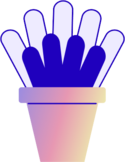ADHD Tips: Your Guide to Thriving Every Day
Living with ADHD can be challenging, but with the right strategies, you can thrive and live life to the fullest. Here are the five top tips for getting the most out of life with ADHD.
ADHD Tip 1: Foster Genuine Connections
At the top of the list is connection, often referred to as the other "vitamin C" – vitamin connect. Connection is the cornerstone of a fulfilling life, driving everything good while disconnection drives what’s harmful. Now, more than ever, it's crucial to find ways to reconnect meaningfully.
Connection can take many forms – with people, pets, causes, or artistic realms. Whether it's through friendships, family relationships, dedication to a cause, or appreciation of beauty in art or nature, connection gives life meaning and satisfaction. It’s not just about being accessible online; it’s about fostering relationships in the real world.
ADHD can sometimes make you feel disconnected, but by prioritizing genuine connections, you counter these feelings with fulfilling and supportive relationships.1
ADHD Tip 2: Find a Creative Outlet
Creativity is vital for those with ADHD. Identifying a creative outlet that challenges and excites you can be transformative. This "right difficult" task should be something that matters deeply to you and allows you to engage the creative part of your mind. Once you find it, it becomes a lifelong companion, much like dancing or writing for some. Having a creative outlet helps channel your energy constructively and provides a sense of fulfillment.
ADHD Tip 3: Educate Yourself About ADHD
Understanding ADHD is fundamental. When you take the time to learn about your condition, you can begin to see it as a unique and fascinating way of being in the world, not just a list of symptoms. Dive into books, articles, and resources, and talk to others who share your experience. Embracing ADHD helps you take control of it, enabling you to master it rather than letting it master you.2
ADHD Tip 4: Embrace Physical Exercise
Physical exercise is a crucial element in managing ADHD. Studies have shown that regular physical activity, even as little as 20 minutes three times a week, can produce results comparable to medication.3 Exercise generates the same peptides, hormones, and chemicals that medications do. You don't need to become a gym rat; the key is to find a routine that you can maintain consistently. Whether it’s jogging, cycling, or even dancing, find something you enjoy and make it part of your routine.
ADHD Tip 5: Consider Medication
Medication can be a powerful tool in managing ADHD symptoms, although it may not be suitable for everyone. When it works, medication can be a game-changer, much like how eyeglasses work for nearsightedness. It’s essential to at least consider medication as an option, even if it might not be the right solution for you personally. Whether or not you opt for medication, knowing that there’s an effective intervention available can be reassuring.
Putting These ADHD Tips into Practice
Living with ADHD presents unique challenges, but by considering medication, embracing physical exercise, educating yourself, finding a creative outlet, and fostering genuine connections, you can not only manage but thrive. These strategies offer practical steps to transform potential barriers into opportunities for growth and fulfillment. So, take these tips to heart, implement them in your daily life, and you'll find yourself mastering ADHD rather than letting it master you.
By embracing these top five tips, you take charge of your ADHD, paving the way for a balanced and fulfilling life. Remember, it's all about knowing your options, staying active, continually learning, letting your creativity flow, and building deep connections. Give these tips a try and see how they can make a tangible difference in your life!
Sources:
- Centers for Disease Control and Prevention. (2024, March 27). Social connection. Centers for Disease Control and Prevention. https://www.cdc.gov/social-connectedness/about/index.html
- Fairbank, R. (2023, March 1). An ADHD diagnosis in adulthood comes with challenges and benefits. Monitor on Psychology, 54(2). https://www.apa.org/monitor/2023/03/adult-adhd-diagnosis
- Mehren, A., Reichert, M., Coghill, D., Müller, H. H. O., Braun, N., & Philipsen, A. (2020). Physical exercise in attention deficit hyperactivity disorder - evidence and implications for the treatment of borderline personality disorder. Borderline personality disorder and emotion dysregulation, 7, 1. https://doi.org/10.1186/s40479-019-0115-2
Join the 30 million people who've turned to Psych Hub for mental health guidance.

